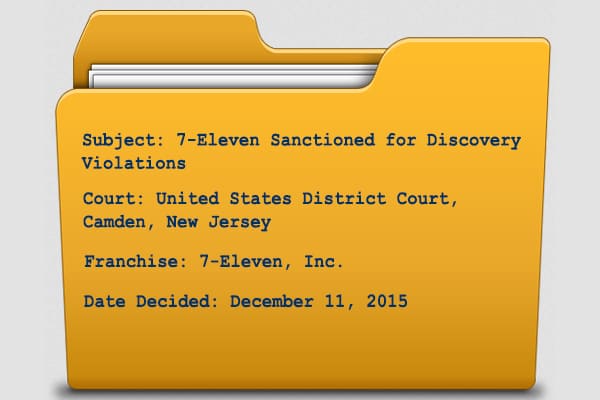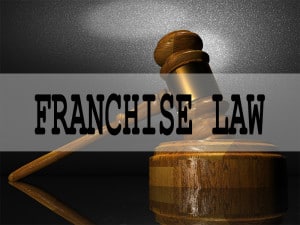
Franchisee Commences Discovery
Franchisee alleges that 7-Eleven launched a campaign to close as many as one hundred 7-Eleven franchises in South Jersey. The Complaint alleged that “Project Philadelphia,” as initially identified, was intended to unlawfully terminate franchises by employing hostile business conditions and intimidation, together with unfair business practices, in an effort to compel Franchisees to terminate their franchise agreements. To this end, the Franchisee, whose action was joined by the Court with two other Franchisees having similar complaints against 7-Eleven, commenced “discovery.” This is a legal term of art referring to the phase in litigation when the parties request and exchange information and documents relevant to the case.
Franchisor Denies Possessing Evidence – High Stakes Litigation Tactic
 As detailed in the Court’s lengthy decision, 7-Eleven’s initial strategy during this phase was to generally deny that it possessed any evidence responsive to the Franchisee’s requests, or respond with general denials and assertions of privilege. This is a tactic often resorted to by parties in high stakes litigation, but a risky one given the federal court rules requiring good faith investigations by parties receiving discovery requests, together with the production of all relevant documents as defined by the complaint allegations and requests.
As detailed in the Court’s lengthy decision, 7-Eleven’s initial strategy during this phase was to generally deny that it possessed any evidence responsive to the Franchisee’s requests, or respond with general denials and assertions of privilege. This is a tactic often resorted to by parties in high stakes litigation, but a risky one given the federal court rules requiring good faith investigations by parties receiving discovery requests, together with the production of all relevant documents as defined by the complaint allegations and requests.
Court Directs Franchisor to Respond to Franchisee’s Discovery Request
After many months of back and forth between the attorneys, the Court issued an order for discovery on 7-Eleven in which it directed the Franchisor to respond to the Franchisee’s requests. 7-Eleven continued to stall and, in the Court’s opinion, made a “lackluster and half-hearted effort to comply with the Order which resulted in a substantially deficient response.” The Court, subsequently, found that 7-Eleven had violated this Order.
Eventually, and after a second order had been issued from the Court, the Franchisee was satisfied with the responses it received to its discovery requests. These responses painted the following picture of the Franchisor’s activities: 7-Eleven mobilized substantial corporate resources to implement a plan it referred to as “Project P.” In its evolving discovery strategy, the Franchisor admitted that during 2012, it had terminated ten franchises, and an additional eleven stores were “surrendered” in South Jersey. The Franchisor’s documents also disclosed that it had been training scores of new managers and assistant managers, as well as hundreds of sales associates, to take over the operations of these franchises. 7-Eleven’s justification for the project was that the Franchisees were involved in fraud, and thereby, had violated their franchise agreements.
As an aside, 7-Eleven’s counsel also offered that it had not produced the “Project-P” evidence sooner, because the Franchisee had mistakenly demanded information about a “Project Philadelphia.” The magistrate bristled at this excuse, noting that the federal rules of evidence did not require “magic words” to obtain clearly relevant discovery.
Court Admonishes Franchisor and its Attorneys for “Dreadful Response” to Discovery Order
 In the end, the Court declined the plaintiff’s request to strike the Franchisor’s Answer to the complaint, which could have been a death blow to 7-Eleven’s defense, reasoning that such a penalty would have been too severe. However, the Court admonished both the Franchisor and its attorneys for their “dreadful response to the [Court’s discovery order],” which had a “very negative impact on the Court’s efforts to assure efficient case management…” The Court warned 7-Eleven that it would be watched closely as the case proceeded. However, the Court directed the Franchisee to submit an application for an award of reasonable attorneys fees and costs incurred as a result of the Franchisor’s dilatory discovery practice.
In the end, the Court declined the plaintiff’s request to strike the Franchisor’s Answer to the complaint, which could have been a death blow to 7-Eleven’s defense, reasoning that such a penalty would have been too severe. However, the Court admonished both the Franchisor and its attorneys for their “dreadful response to the [Court’s discovery order],” which had a “very negative impact on the Court’s efforts to assure efficient case management…” The Court warned 7-Eleven that it would be watched closely as the case proceeded. However, the Court directed the Franchisee to submit an application for an award of reasonable attorneys fees and costs incurred as a result of the Franchisor’s dilatory discovery practice.
Likely, more to come on this interesting case.
Citation: Younes v. 7-Eleven, Inc., 2015 U.S. Dist. LEXIS 166306
BE ADVISED that these comments are not intended as legal opinions and are not to be relied upon as legal advice. If you need legal advice, please contact us to discuss the specifics of your franchise business.
© KilcommonsLaw, P.C. 2015the
